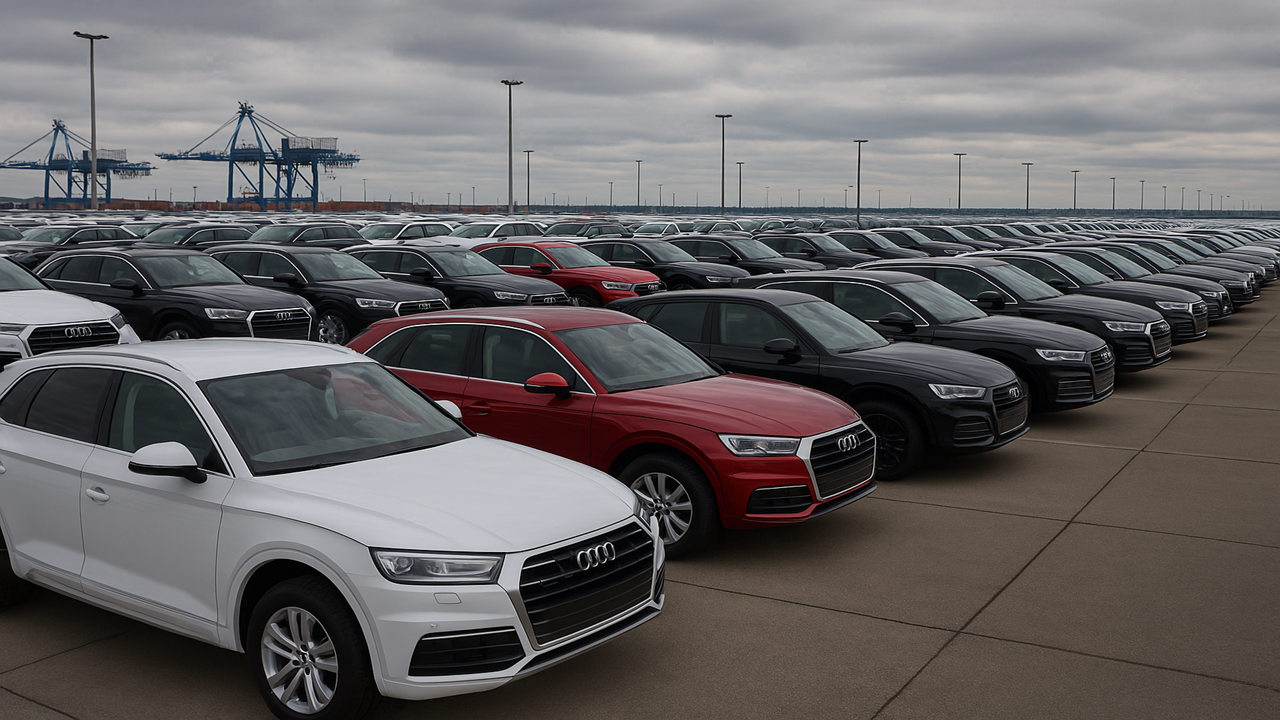Audi Halts U.S. Car Shipments as Trump’s Tariff Takes Effect
Audi has frozen all U.S.-bound car shipments following a 25% tariff imposed by Donald Trump on foreign auto imports. With thousands of vehicles stranded at ports and the Q5 SUV—its bestselling model—directly affected, the company is reassessing its supply strategy. Industry leaders and European officials are meeting to address the trade shock and mitigate broader economic risks.

Audi, the luxury marque under Germany’s Volkswagen Group, has suspended shipments of its vehicles to the United States after the Trump administration enacted a 25% import tariff on foreign automobiles, effective April 2. The move leaves thousands of cars, including Audi’s top-selling Q5 SUV, stranded at U.S. ports as the company and the broader automotive industry scramble to assess the impact of the sweeping duties.
The announcement was confirmed Monday by an Audi spokesperson, who explained that all vehicles arriving after April 2 are being held in place while the company determines how to proceed. The halt was communicated to U.S. dealers through a memo, first reported by Automotive News, stating that shipments would be frozen “until further notice.” The move is expected to cause ripples across the company’s U.S. operations, especially since all of Audi’s models sold in the American market are imported either from Europe or Mexico—regions now directly in the tariff’s crosshairs.
Audi’s Q5, its most popular model in the U.S., is manufactured in Mexico. With this production source now subject to the new tariffs, pricing structures and delivery schedules face immediate upheaval. Audi’s remaining lineup—also foreign-made—is equally vulnerable, raising serious concerns among dealerships already dealing with a tight supply environment. According to the spokesperson, Volkswagen’s broader U.S. inventory includes around 37,000 vehicles, enough to support about two months of sales. But beyond that, future availability remains in limbo.
Across the industry, the reaction has been swift and uneasy. Most carmakers operating in the U.S. typically maintain less than three months of inventory, according to data from Cox Automotive. That gives them some leeway in the short term, but it’s a narrow window in which to develop contingency plans. Automakers must now decide whether to eat the cost of the tariffs, pass them onto consumers, or overhaul logistics and sourcing strategies—a set of options that could take months or even years to implement effectively.
The timing of the tariff could not be worse. Global supply chains are still recovering from years of pandemic-related disruption and inflationary pressures. Adding a 25% surcharge on foreign-built vehicles threatens not only consumer prices, but also production stability and international trade relations. The stock market quickly reflected these fears, with European shares falling to their lowest level in over 16 months amid panic over potential price hikes, weakened demand, and the broader specter of a global slowdown.
European auto executives are now turning to policymakers for support. On Monday, a high-level meeting was scheduled with European Commission President Ursula von der Leyen, as manufacturers and government officials work to coordinate a response. For Germany, a nation whose economic health is tightly linked to automotive exports, the stakes are particularly high. And for brands like Audi, the fallout could be felt far beyond American ports.
This isn’t the first time U.S.-EU trade tensions have spilled into the auto sector, but the scale and suddenness of this policy shift have forced companies to react with extreme caution. While some manufacturers may be able to pivot production to U.S.-based facilities or negotiate temporary exemptions, brands heavily reliant on imported vehicles—especially in the luxury segment—are facing a harsh new reality.
Audi’s decision to hit pause on U.S. shipments sends a clear signal: until there’s clarity on policy and pricing, business as usual is on hold. Whether that pause lasts weeks or months will depend on how quickly trade negotiations evolve and whether automakers find a viable path forward. In the meantime, U.S. dealerships, European manufacturers, and consumers alike are bracing for what could be a long, uncertain ride.










